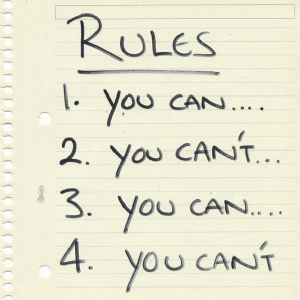So now that we covered the overview and the pro’s of interning for a small vs large company, let’s talk about the con’s!
Interning at a Small Company: The CONS
This information is coming from my own experiences working for two small, start-up companies as well as friends who have worked for small advertising, marketing, PR, and online companies; here is what we came up with:
1. Small budget, Small Office, Small Everything

When interning for a small company (especially start-ups or new companies) it is an inevitable fact that you won’t be working in a real or large office with a lot of space or with a lot of resources.
For instance, many times you will have to use your own computer because the company cannot afford to outfit you with one.
This means you will either be working remotely or if you do go into an office, you have to lug your computer there, use your hard drive/memory, battery, etc.
Many times you will be working in cramped, close quarters, so don’t expect your own desk.
Budgets in small companies are tight so you most likely won’t be going out to lunch or doing big events or anything like that.
Though you can certainly ask for one, don’t expect any perks like a stipend for lunch or travel because it probably isn’t going to happen simply because the money isn’t there to give out.
Many times small companies don’t even have the resources to hire you as an employee (even in the near future) because they have just enough to cover expenses and pay themselves, so if you are looking to be offered a job for your services, this may not be the way to go.
However, if you are still a student (Sophomore, Junior) this type of company may be just what you are looking for; you can work with great people, get some experience and build your skill set, and since you aren’t looking for a job anyway, you don’t have to worry about being hired.
2. Less Chance For Networking

If you are interning in a small office, with only a few employees, you will not have the same chances to network and interact with other employees as you would if you were working at a larger company.
Small companies usually don’t have big departments full of people for you to meet, learn from and interact with.
A small company will most likely have one or two employees working in each “department” and they will probably be very busy since they have to shoulder all of the responsibility of an entire department.
You may not get the chance to meet influential people, go to office events, meet others with your interests, or be introduced to people who may be able to help further your career.
Remember that you may meet great, influential, smart people at a small company too, but with a large company there is more variety, and just plain MORE people to choose from.
For example, if Bob is busy, you can talk to his secretary. If Linda can’t meet with you on Tuesday, Sally is more than happy to see you Wednesday. It’s all about the size/quantity in this case!
3. Having a “No-Name” on Your Resume

One of the biggest reasons a lot of people shy away from taking internships with small, “no-name” companies is because they think it will appear unimpressive on their resume, and to some extent, they are right.
Think about it this way…
if you were comparing two people based on their work experience, and you saw that one person worked for ESPN while the other person worked for “Joe Schmoe” Company, you would automatically be more impressed with the first person simply because you have heard of ESPN, you know what the company represents and it has been around for a long time.
For an employer, it would mean even more because ESPN is a selective company to work for as they do not take just “anyone.”
While “Joe Schmoe” Company may be just as competitive and hard to attain as a job with ESPN, this is not always obvious or known to a person who has never heard of the smaller company.
However, know that if you do take an internship with a small company, the duties and responsibilities you list as part of your work experience is very important, and if you have a skill that “X” Company is looking for, you may be just the person for the job!
Interning at a Large Company: The CONS
This information was compiled from my own experience interning at ESPN, as well as the insights from those who have worked for Condé Nast, Bloomberg, Fidelity, FOX and other large companies (thanks guys)!
1. Hard to Get Recognized

One of the biggest complaints among interns who have worked for large companies is that it can be very difficult to be noticed since there are so many interns/employees.
You have to work twice as hard to gain recognition and even then you may never get whatever it is you are seeking because there is so much competition.
It can be frustrating to put in so much time and effort into a company that doesn’t notice how hard you are working, and this can be particularly frustrating for an unpaid intern.
In a large company, it can be hard to even see how you are contributing because sometimes you never see “where your work goes.”
Many times you sit at a computer plugging in numbers to spreadsheets or doing a lot of office-type work and never seeing how those duties affect the overall company.
The good news is by doing the tedious, but necessary tasks at the lower levels, you get a better understanding of HOW the company works from the ground up, which is essential for any good employee.
2. Stricter Rules, More Time to Complete Tasks

When interning for a large company, you will inevitably be responsible for following strict protocols and rules in order to make sure everything runs smoothly both in terms of getting work done and doing things legally.
You may find the number of rules to be annoying, especially when you are trying to complete simple tasks.
Many times, even the smallest things have to go through several people, so something that may have only a day can take much longer than anticipated.
The fact that you have to report to so many different people can become frustrating, especially if you are getting blamed for not getting something done on time (even when clearly you had no control over how fast it could be done).
No one wants to hear why something cannot be done, and as one of my sources put it, his company would say “don’t come with problems, come with solutions.”
3. Expectations Are Very High

Because big companies have a lot of resources and essentially their “pick” of those applying for internship/employment opportunities, they expect those they choose to bring something serious to the table.
The good thing about working for a small, start-up company is the fact that many times, the people in charge are still learning too so there is less pressure on you to perform perfectly.
However, at a large, established company, this is not he case. The company will teach you everything you need to know and how to complete your tasks, but the rest is up to you.
Be prepared for a lot of responsibility.
As one of my sources put it, an internship is like an extended interview and those in charge want to see if you can handle whatever they may throw at you.
It is not uncommon to work long hours/weekends and be expected to perform the tasks of a paid employee.
One of my sources pointed out the fact that because the economy is doing so poorly, many jobs have been cut leaving one employee to perform the tasks of 2-3 employees; the same can be expected of interns.
My source also pointed out that many perks like travel/food stipends may be cut (due to the economy) and they may expect interns to pay for their own gas for work-related events, and things of that nature.
Parting Wisdom
If you can suck it up for a while and show your bosses you can hack it, it may pay off with a job offer.
Keep in mind that no matter how bad or frustrating an internship is, it is just that: an internship. Your commitment to the company is for only a small window of time and it will be over before you know it.
Don’t forget that no matter where you end up interning, you will always be learning something you did not know before, experiencing new things, building SOME form of skill, and meeting people who may have the potential to change your life.
If you take an internship you hate, look at it as a learning experience so you won’t make the same mistakes next time. Take away what you did enjoy and leave everything else behind because there will always be other opportunities.
If you had a boss you didn’t get along with or one who was happy to see you leave, don’t let it get to you.
Consider the things you saw as weaknesses in yourself (or those pointed out by your boss) as things to work on, and leave it at that.



Having interned at a large company (47K+ employees), where I currently work full-time I certainly think it has it’s advantages. One of the biggest advantages is that of networking, which you mention above. Working with dozens of people throughout the company, if not more, allowed me to gain insight into all aspects of the company. When it came time to looking for a job, I had an idea what was available, and if it was suitable for me. At the same time, within a smaller company you do have a greater chance to make an impact and get noticed. It certainly depends on what you want. I think interning with a smaller company going into your junior year would be good experience to then work for a larger company prior to senior year. Hopefully with that path you can gain experience and network appropriately to hit the job market running after graduation.